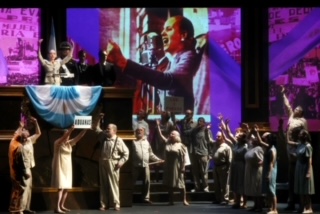
Attending the performance of “Corpus Evita” on February 18th at West Bay Opera was a surreal experience I am quite sure none of us in the audience will be lucky enough to repeat. The three creative geniuses responsible for the opera’s existence were in the theatre with us. The Conductor and Stage Director was none other than Jose Luis Moscovich, the librettist of this opera. Carlos Franzetti, the opera’s composer, was in the audience, as was Lorenz Russo, who originated the concept for the opera. It was an honor to share the experience with these men whose passion for the story was obvious from the very first scene.
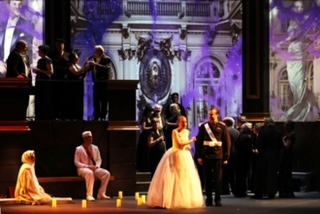
Preceding my review, I am inserting the following essay written by Jose Luis Moscovich that explains why this opera needed to be written. It is also why it needs to be performed more often in more cities around the world. He is the only one who can speak with authority about this production. My attempt to describe the passion and purpose of the opera would be inadequate, so here in total I have inserted his essay:
“ABOUT CORPUS EVITA
A cold Monday morning in March 1976, I was leaving my grandma’s old house in Rosario, Argentina, where we lived, to go to school. I was 16 and had just started 12th grade. I walked down the veranda, opened the door and locked it behind me. As I reached the tall Victorian iron gate, two machine guns, pointing at me appeared out of nowhere. An officer behind the soldiers ordered me to unlock the gate. I did, and they brought me back into the house. The officer asked me if I owned a bicycle. Yes, I said. And what color was it? Black. And was I planning to paint it? No. It was brand new. Then he told me that Victor, my best friend, had been picked up at the corner of the school holding a can of red spray paint. He was 17. Barely a week after the military coup that ousted President Isabel Perón, political graffiti was a serious crime. Victor had told them that he was coming to my house to help me paint my bicycle.
Somehow, it occurred to me to say to them that my dad was an army doctor. It was partially true. More than twenty years earlier, during Peron’s first presidency, he had been called to the reserves for two years and had been given the rank of army lieutenant. The tone of the conversation changed after I mentioned this. It may also have saved my life. They usually arrested anyone they found in a suspect’s personal address book.
After searching the house in vain for subversive leaflets, they took me back to the sidewalk. They wanted me to identify my friend. About 100 feet down the street there was an olive-color Ford Falcon with no license plates. And there, framed perfectly by the rear windshield, was Victor’s bespectacled face, a mane of curly hair, looking at me with a mixture of bewilderment and terror. I’ve seen that face and those eyes in my dreams many times since. I still do, once in a while. It wasn’t until 30 years later that I finally found out what happened to him. He told me. He was one of the lucky ones. He was jailed for several years. He and his family had to leave the country upon his release. Victor was a second-generation Argentine-born citizen. But he was Jewish. So, his Argentine passport was taken away. They were able to cross over to Uruguay, where the Israeli embassy gave Victor a passport and got them on a fight to TelAviv. Eventually, they ended up in Barcelona, where they have been for four decades. Victor found me online and sent me an email asking if I would be willing to talk to him. He was afraid I hated him for what happened. I was eager to see him. He flew to San Francisco from Barcelona with his wife and teenage son, and we spent a week together. It was very healing. We rekindled our friendship.
Over the better part of a decade, as Argentina descended into the unspeakable darkness that followed the coup, the scene with the Ford Falcon would repeat itself endlessly. The son in law of Valeria, my first chamber music pianist at the conservatory, was also picked up. He never came back. Many people’s lives were touched directly by the violence. Among the mostly younger detainees were pregnant women. They were kept alive in captivity until they gave birth. Then their babies were given to childless military couples. The mothers were flown over the Río de la Plata and dropped to their deaths. But first, while still alive, they would get their bellies sliced open, so their bodies would not float. Democracy was restored in December 1983. Four decades later, DNA testing opened up the next chapter in the story, as the stolen babies started to discover the truth about their adoptive parents, thanks to the work of Mothers of Plaza de Mayo, a group of women who would don white headscarves and walk peacefully on the Plaza every week, defying the military and demanding to know the fate of their abducted children.
Juan Domingo Perón was a populist leader who became president of Argentina in 1946. Perón’s second wife, Eva (Evita), who died young in 1952, became a cult figure during his time in office. Since her death, several generations of politicians have declared themselves the successors to Eva Perón and used her image to get themselves ahead. Eva’s myth and the electorate’s ignorance have kept the country stuck in a loop. People keep returning to the myth and they keep voting for it. And politicians keep handing out benefits that the country’s economy can ill afford, in a never-ending downward spiral. Perón was ousted in a military coup in 1955 and went into exile in Spain. He returned to Argentina in 1973 and was voted into office again, this time with his third wife, Isabel, as vice-president. Perón was a right-wing populist. The movement that brought him back to power was a coalition of left and right-wing people. Once in office, Perón leaned to the right and the mostly younger leftists ended up out of favor. Eventually, a left-wing guerrilla movement sprung up. When he died in office, in 1974, Isabel had to deal with a divided society and a guerrilla. She relied on the advice of a Rasputin-like character, José López Rega, who had been Perón’s private secretary during his long exile in Madrid. He had a keen interest in the occult and was known as “el brujo” (the sorcerer.) Because of the big age difference between Perón and Isabel, López Rega was also rumored to be Isabel’s lover. Inexperienced, unprepared for the pressures of the office, and lacking Evita’s charisma, Isabel foundered. There was hyperinflation. López Rega was instrumental in the creation of the Argentine Anticommunist Alliance, a right-wing death squad that abducted and killed leftist leaders. Under López Rega’s influence, Isabel signed a decree enabling the army to annihilate the guerrilla. Soon thereafter, the armed forces went out of control and toppled her administration. She was ousted in March 1976.
The question of Isabel’s responsibility for the deaths that occurred during her time in office was never settled. Spain refused to extradite her so she could be tried in Argentina. She just turned 93 and continues to live in luxury in Madrid. Populist leaders are seldom held to account. Even worse: sooner or later, populist leaders turn into dictators. There are many examples: Marcos in the Philippines, Erdogan in Turkey, Orban in Hungary, Putin in Russia. Should Isabel not be held responsible for her part in enabling the tragedy that followed her ouster? Are ignorance or incompetence valid excuses for a politician to avoid responsibility for their own actions while in office? What if those actions result in the death of people? Isabel will likely die in luxury in Madrid, never having confronted these questions.
When Larry Russo approached me in 1999 to ask me to write the libretto for Corpus Evita I declined at first. But over the next several weeks, as Larry continued to insist, I realized that this would be a good opportunity to explore these issues. What would it be like to see the true nature of Isabel’s relationship with López Rega? Was she really weak, or was she set up to fail in a world dominated by men? Could she find the strength to confront her own sins and own up to them? That would be cathartic for a society that’s still divided about what happened back then. We may never see this in real life, but we can imagine it through the magic of opera. And so, writing Corpus Evita ended up being a personal exorcism for me, and I believe for Carlos as well.
José Luis Moscovic”
What resulted is an emotional opera sung in English comprised of 7 scenes divided into 2 acts. The essay above expresses the tale depicted in this production. It follows Isabel Peron’s rise and fall from power in Argentina and the effect she had on the people there. Just as critical to this story is the myth of Eva Peron, the role her corpse played in the events of the day, and Isabel’s desire to be strong and loved like Evita.
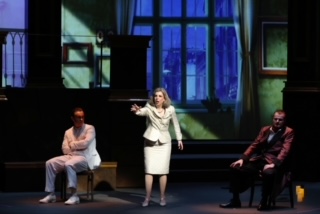
I was so engaged by the story unfolding in the opera’s 7 scenes that I missed some of the details about the performances of the artists on stage. They were brilliant I know, because at times their vocals gave me chills and at times I was on the edge of my seat to see clearly just what was transpiring between the various characters on stage. The characters being portrayed are not fictional creations. These performers had to make us believe they were the people they were portraying, and they did. West Bay Opera always casts first class talent in the opera community. This was no exception. There were just six main performers, all seasoned renowned opera singers whose vocals were well suited for their roles.
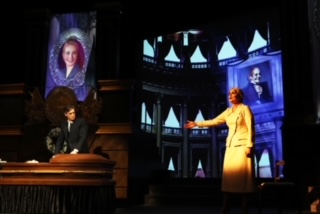
Jessica Sandidge, soprano, was captivating as Eva Peron. Her credits are numerous and span the country, which is no surprise. Her strong vocals and amazing range were perfect for this strong character in the story. Sandidge made you believe that she was the embodiment of Eva Peron. Sara LeMesh, soprano, did the same as Isabel Peron. While her vocals were strong, she was able to show a vulnerability critical to the role. She was a tragic figure from beginning to end, trying desperately to be like Eva Peron and unable to fulfill that role in the eyes of the people. LeMesh portrayed that dichotomy perfectly. The titular role of “Corpus Evita” was sung by mezzo-soprano Laure de Marcellus. Her credits span the globe, and we are the beneficiaries of that experience she brings to the West Bay Opera.
Patrick Bessenbacher, tenor, had the challenging role of Ministro, the advisor to Isabel who controlled her throughout her presidency. He was a believable power-hungry government official. His vocal range was needed in this role, as was his strong voice. Anders Froehlich, baritone, portrayed the doctor whose role was to keep Eva Peron’s corpse viable to be adored by the public. He used his voice well to show the struggle he was going through. Of course, the role of Juan Peron was made for a bass, and Casey Germain’s voice let you know who was in charge.
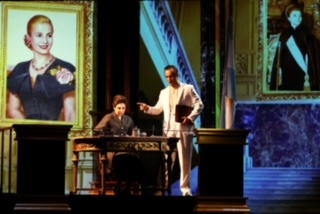
I wish I could mention the chorus members all by name here. They played a very big role in this production. Both singing and acting skills were needed by these chorus members. They were on stage for a good part of the performance, as they had three major roles: Peronist sympathizers, 1970’s mourners, and 1990’s souls of the disappeared. The casting for these roles was spot on.
Productions such as this showcase the talent of the performers, as they should. I do have to mention the amazing sets behind the performers and the costumes/hairdos that were perfect for the period depicted and the position in society held by each performer. When these aspects of a show are perfect, they aren’t noticed as much as they should be, but when they aren’t perfect, they detract from the entire performance. The sets and costumes here were just right. Though the opera is sung in English, the subtitles on the screens were helpful as well. These factors, and the beautiful music of the accompanying orchestra, made for a seamless production that allowed us in the audience to focus on the story being told.
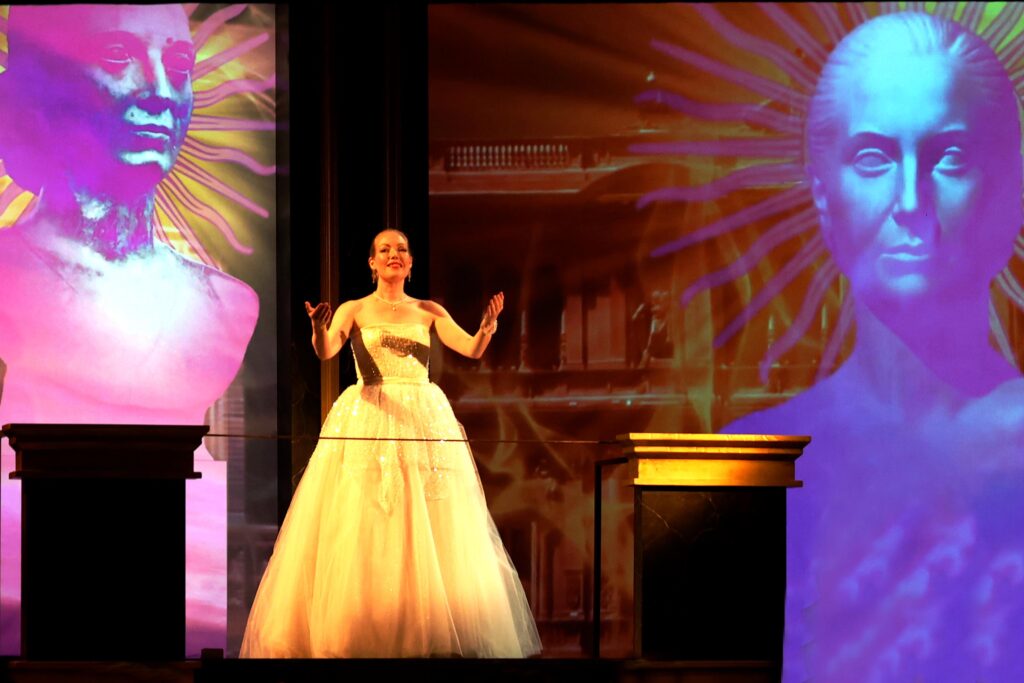
A compelling story, superb talent, and beautifully designed sets combined to make this production of “Corpus Evita” one of the most memorable performances I have ever and most likely will ever be lucky enough to experience.
The opera is only being performed at West Bay Opera through February 25th. Shows are held at the Lucie Stern Community Center in Palo Alto. It would be great if they could extend the run so that more of us in the Bay Area and beyond could see this fabulous performance. For more information about this show, how to get tickets, and other programs West Bay Opera has to offer, see their Website




Be the first to comment